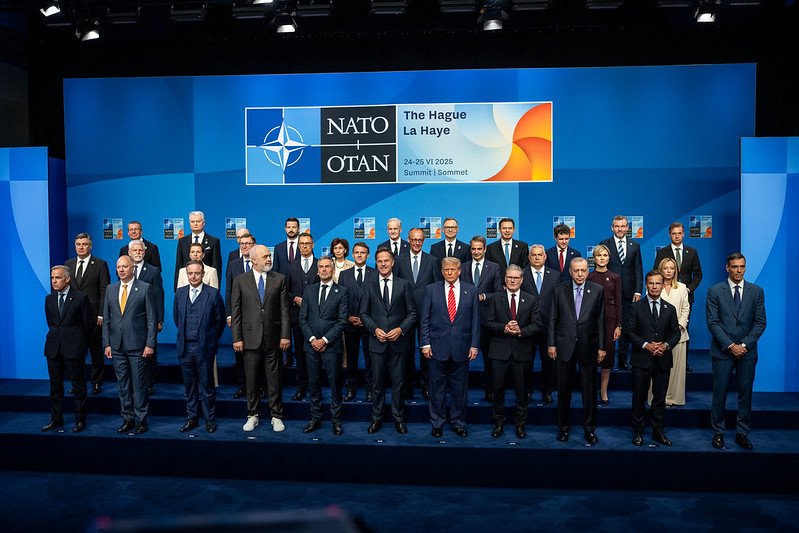NATO wrapped a high‑stakes summit with a headline commitment: move the Alliance toward spending 5% of GDP on defence and broader security by 2035. It’s the clearest signal yet that Europe intends to bulk up—financially, industrially, and digitally—after two years of war‑economy lessons from Russia. The decision sits at the top of the official Hague Summit Declaration and the Alliance’s post‑summit brief, which frame the 5% as a long‑term investment envelope under Article 3 duties.
This wasn’t abstract posturing. The Declaration and ministerial guidance spell out a split: 3.5% for “core defence” (the kit and forces) and 1.5% for defence‑ and security‑related investments (infrastructure and resilience, read: cyber, critical nodes, industrial base)—a scaffolding ministers trailed ahead of the leaders’ decision.
Inside the World Forum venue, the mood was brisk, bordering on transactional. Outside, protests filled The Hague’s streets—a reminder that the new spending era will meet domestic resistance across Europe’s coalition governments.
What’s materially different after The Hague
The 5% signal
Timelines and enforcement mechanisms remain fluid, but the direction of travel is unambiguous. European treasuries now have a benchmark that will shape multi‑year order books for air defence, artillery, and munitions stockpiles, with scrutiny shifting to bottlenecked supply chains and production lead times. Early moves followed fast: the Netherlands signalled a 2026 defence budget rise toward the goal, citing the 5% track. Expect copy‑paste announcements as national budgets roll.
Ukraine stays front‑and‑center
Kyiv’s needs dominated the subtext. NATO’s official recap explicitly twinned the 5% decision to sustaining support for Ukraine; leaders also used the NATO‑Ukraine formats to underline air‑defence and ammunition pipelines. At the Summit’s Defence Industry Forum, Volodymyr Zelenskyy sharpened the sanctions message, urging partners to choke off foreign components still turning up inside Russian missiles and drones—an enforcement push that ties directly to the “security‑related” 1.5% bucket.
Cyber as a real war domain
The summit week delivered a teachable moment: rail chaos near Schiphol and DDoS waves against Dutch municipal sites were investigated as sabotage and pro‑Russian nuisance attacks, underscoring why resilience is now budgeted, reported—and regulated. The 5% framework elevates cyber from a slide to a line item.
The inside game: procurement tempo and industrial policy
The Hague made it plain: European defence is entering an industrial‑policy era. The 5% banner doesn’t just fatten toplines; it rewires how Europe buys—pointing towards:
- Framework buys for air defence and munitions that prioritize serial production and cross‑border standardization.
- Capacity reservations in private industry (explosives, propellants, electronics, composites) to reduce lead‑time volatility.
- Resilience spending (the 1.5%) on cyber, energy, and transport infrastructure that keeps forces and factories online.
The politics are jagged. Spain publicly pushed back on the 5% idea ahead of the summit, and even supportive capitals will face “guns‑vs‑butter” arguments as budgets rise. Protesters in The Hague hammered exactly that point. But the Declaration gives defence ministries a reference text to take to parliaments—and to industry.
The geopolitics around the table
Russia’s war economy loomed over every session. The communiqués thread deterrence with sanctions enforcement and industrial ramp‑up. Side conversations inevitably touched Iran’s risk calculus amid Middle East jitters; even the street politics bent that way, with protests linking NATO’s hike to fears of a wider conflict. That’s uncomfortable optics, but also the strategic backdrop for the 5% logic.
Security posture at home was maximal. The Dutch state ran Operation Orange Shield—the country’s largest security operation on record—locking down air, sea, rail, and cyber corridors around the World Forum. The scale was the message: the Alliance treats hybrid disruption as part of the threat surface, not a footnote.
What to watch next (and what it means for builders)
1) Definition fights—what counts toward 5%.
The split (3.5% “core” + 1.5% “related”) gives room to steer money into infrastructure and resilience, but expect robust debates—and audits—over definitions. NATO’s own topics page now spells out the framework; national statisticians and defence auditors will sharpen it in practice. For industry, the safe bet is to tie your offer to a named capability plan and a trackable readiness metric.
2) Sanctions enforcement becomes procurement policy.
Zelenskyy’s component‑tracking plea aligns with EU moves (the 18th sanctions package) to target dual‑use leakage. Translation: compliance is a competitive edge. Firms that can prove their supply chains are clean—and help primes and governments police theirs—will win faster.
3) Cyber budgets with teeth.
From DDoS to rail cable sabotage, the summit week was a case study in hybrid pressure. Follow the NCIA and national cyber agencies for RFPs that blend detection, hardening, and incident response with measurable uptime. If you sell cyber, map directly to mission assurance for critical infrastructure.
4) Industrial base acceleration.
The fastest money will chase ammo lines, air‑defence interceptors, and propellant chemistry—but watch adjacent needs: power electronics, machine tools, additive manufacturing, composites, and NDT equipment. The moment favours serializable designs and digital QA that cut time‑to‑acceptance. (And yes, Europe will reward local content.)
Founder & prime contractor note
If you build for defence, align to the spend split:
- 3.5% Core defence: show unit economics and ramp curves that survive a reliability and throughput audit.
- 1.5% Security‑related: sell resilience with SLAs (hours, MTTR, cyber controls) that plug into national readiness dashboards.
- For both: compliance and traceability—on sanctions, components, and cyber—are now features, not footnotes. The Hague just made them part of the contract.
The Hague Summit didn’t just move a target; it moved the centre of gravity. 5% by 2035 reframes European defence as an industrial programme with procurement speed, resilience, and sanctions enforcement baked in. The street protests underscored the politics. The rail and web disruptions highlighted the threat surface. But the policy arc is set. For treasuries, it’s a 10‑year capex plan. For factories, it’s visibility. For startups, it’s a runway—if you can deliver faster, cheaper, and provably better.
Sources & further reading
National follow‑through: Netherlands budget signal toward the goal. Bloomberg

